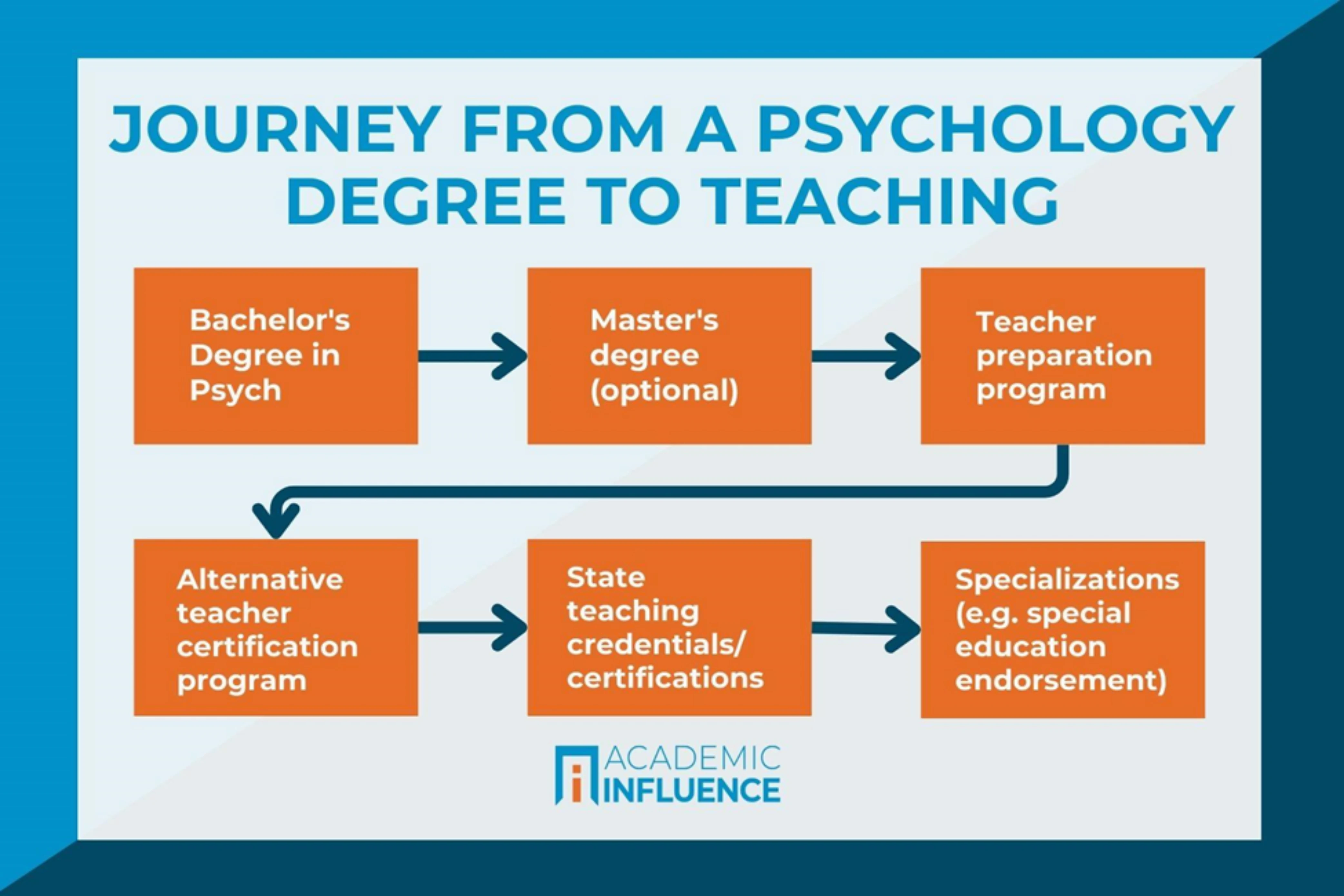What Subject Can I Teach With a Psychology Degree?

Key Takeaways
- Psychology graduates have opportunities to teach in public school settings after earning teacher certification.
- Certification requirements for teachers differ by state.
- Earning an advanced degree in psychology is the recommended path to a position as instructor.
Psychology graduates often feel uncertain about what subjects they can teach with their degree, struggling to determine how their expertise fits into school curriculums. However, complementing a psychology background with teaching credentials opens up diverse academic instruction opportunities spanning primary schools to universities.
By matching complementary teaching areas to their existing knowledge, psychology degree holders can fulfill their passion for education across unexpected disciplines.
Psychology’s Role in Education
The role of psychology in shaping our understanding of learning and motivation serves as a bedrock for educational practices. Psychology majors acquire a solid theoretical grounding perfect for future teachers who want to pursue careers in teaching or developmental psychology, for example.
Educational psychologists, armed with a master’s degree and often specializing in human development, contribute significantly to understanding human behavior in educational settings. Psychology teachers impart knowledge about psychological theories to students, shaping future professionals in the field.
Just getting started? If you’re interested in the field of psychology, check out our Psychology Major Guide. And here are some of the best research universities for psychology degrees.
Bottom Line: The emphasis on mental health within psychology aligns with the holistic approach to education, addressing both academic performance and the well-being of students. Overall, the integration of psychology into education proves instrumental in fostering effective teaching methods and nurturing the development of learners.
Teaching Psychology in High School
Teaching psychology in high school requires educators to meet specific educational and certification requirements. Typically, a bachelor’s degree in psychology or a related field is the foundation, and many pursue a master’s degree for a more in-depth understanding. Educational psychologists receive teacher training to ensure that psychological information is disseminated effectively.
The allure of high school psychology is its relevance, as it deep dives into human behavior and growth and encourages critical thinking. Teachers enhance students’ academic pursuits and personal development by fostering learning settings with real-world applications.
Back to TopAlternative Pathways to Teaching with a Psychology Degree
Alternative certification programs cater specifically to psychology graduates, providing an accelerated avenue into the teaching profession. These programs acknowledge psychology majors’ unique skills and streamline the transition into the education sector.
State-specific variations in certification requirements add an extra layer of complexity. Each state has its own set of guidelines and prerequisites for aspiring educators. Whether it’s an endorsement in psychology teaching or a broader educational psychology program, navigating these state-specific requirements is vital for a seamless transition into teaching.
Key Point: The requirements for teaching psychology, especially in a public school setting, differ by state, but there are often alternative certification options that can move psychology graduates into an educator role quickly.
Factors Affecting Specialization and Teaching Opportunities with a Psychology Degree
When asking yourself, “What Subject Can I Teach With a Psychology Degree?” the following important aspects will influence your teaching career:
- Levels of Education: Adjust your focus to elementary, middle, high school, or college based on your expertise and love for psychology.
- Certifications and Specializations: Strengthen credentials with pertinent certifications to gain access to various learning environments.
- Field of Expertise: Examine subfields of psychology, such as developmental or educational psychology, to match interests and particular issues.
- Career Advancement: Continue to grow as a teacher by taking advantage of opportunities to broaden your knowledge and improve your delivery of instruction.
- Networking and Collaboration: Attend conferences, meet with educators, and share experiences to identify trends and investigate prospects for collaborative teaching.

Back to Top
Special Education and Psychology
Psychology comprehends and instructs students with special needs, creating a symbiotic relationship between the two disciplines. Armed with a deep understanding of human behavior and developmental psychology, psychology majors are well-equipped to address the unique challenges students with diverse learning needs face.
Graduates with a psychology degree often pursue teaching careers, leveraging their knowledge to enhance educational practices and promote positive student outcomes. Psychology graduates excel in special education, using their academic background for effective classroom management and applying theories to foster inclusivity.
Bottom Line: Through a teacher preparation program or an alternative teacher certification program, psychology majors can gain the necessary skills to adapt instructional methods, support individualized learning plans, and foster the academic and social development of students with special needs.
Higher Education Opportunities
Psychology majors often find fulfillment in teaching at the college level, a path that unfolds through dedicated academic pursuits. The journey typically commences with attaining a bachelor’s degree in psychology. Graduates with a solid foundation in psychological theories and classroom management may choose to dive into an alternative teacher certification program.
This serves as a bridge to the field of education, opening doors to student teaching experiences and providing essential skills for teaching psychology. Aspirants aiming for a professorship often pursue advanced degrees, such as a master’s or even a doctorate, specializing in educational or developmental psychology.
Already have a bachelor’s degree in psychology? If you’re interested in pursuing an advanced degree, check out the fastest accelerated online master’s degree programs in psychology.
Bottom Line: Professionals with advanced education are better equipped to conduct research, contribute to the body of knowledge, and teach in higher education, influencing the academic field of psychology and the perception of human behavior in future generations.
Career Transition: From Psychology to Teaching
The Bureau of Labor Statistics projects that from 2022 to 2032, the total employment in occupations related to education and libraries will grow at a rate similar to the growth of the general labor market. This development and the need to replace departing workers add to the dynamic scene, with an anticipated 857,600 positions annually.

A career transition from psychology to teaching is a metamorphic journey that many individuals undertake. The stories of these transitions often unveil inspiring narratives of passion and resilience. Many psychology majors find fulfillment in the realm of education, leveraging their background to teach and shape young minds.
The Vice President and Academic Editor at Academic Influence, James Barham, PhD, explains that he’s not surprised when he sees psychology majors pursue teaching careers:
“The interpersonal and emotional intelligence competencies honed in psychology studies transfer seamlessly to effective teaching across academic levels. Through practicing active listening, conflict resolution, and counseling techniques, psychology students master relating with diverse populations — enabling an empathetic teaching style.
Strong communication and conceptual conversion skills allow translating complex psychological concepts to broader audiences — helping psychology graduates simplify lessons for student comprehension much like they learned to educate the general public on research findings.”
Teaching psychology has many benefits since majors in the field offer a distinct viewpoint that enhances instruction by illuminating human behavior and developmental psychology. This skill, which integrates psychological theories, is highly valued and is encouraged by alternative teacher certification programs for non-traditional education majors.
If you think a career in psychology may be a good fit for you, but you’re not sure where to start, find out which psychology degree is right for you.
Psychology graduates wield a spectrum of teaching prospects, from traditional roles in secondary schools to innovative paths like online programs. Social psychology, clinical psychology, and educational psychology are among the many choices that offer a canvas for diverse career trajectories.